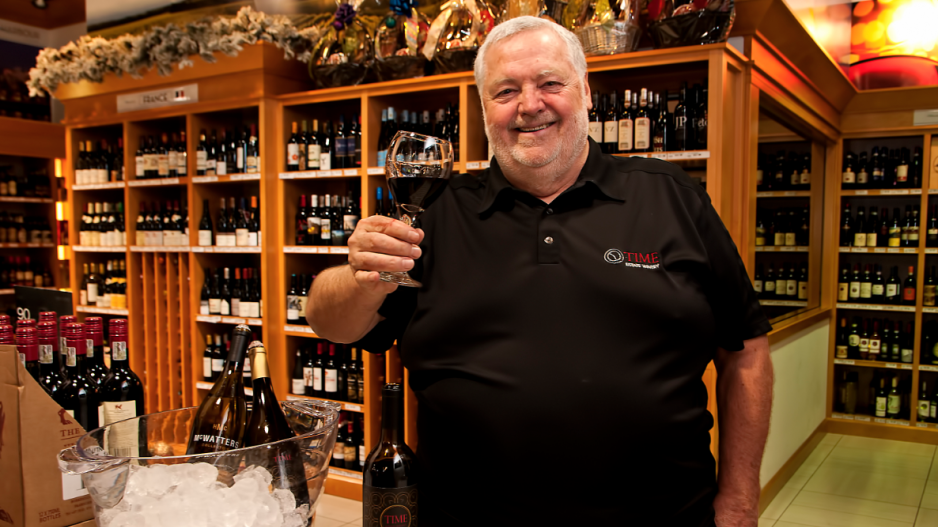The controversial B.C. government initiative to allow wine sales in grocery stores is starting to find support from owners of small wineries in the province.
These small-winery owners include both industry veterans, such as Time Estate Winery owner Harry McWatters, and new entrepreneurs, such as Garnet Etsell, who owns Abbotsford-based Singletree Winery, which launched operations in January.
Both McWatters and Etsell told Business in Vancouver that they are “disappointed” with Vancouver city council for voting earlier this month to reject a staff recommendation to allow wine sales in five grocery stores in the city as part of a pilot project.
Instead, councillors said they wanted to study the matter more.
The December 17 council vote came eight and a half months after April 1, when wine sales in grocery stores became legal.
Church and State Wines owner Kim Pullen, who is wary of rapidly allowing wine sales in grocery stores , made a presentation to council arguing that moving wine sales into grocery stores will prompt a “race to the bottom” because grocery store owners will only want to sell less expensive wine as that price-point will better resonate with grocery shoppers. He argued that this will favour large wineries such as Mission Hill Family Estate Winery, Constellation Brands (NYSE:STZ) and others.
That is not how others see it.
“There’s a big uproar against selling wine in grocery stores but we have not had the support of the BC VQA stores,” Etsell told BIV December 29.
None of the approximately 20 BC VQA-wine-store owners has called Etsell to ask to be able to sell his wine, he said.
In contrast, Overwaitea Foods representatives have been very proactive. They called him months ago, when Overwaitea operated two grocery stores that sold wine: a Save-On-Foods in south Surrey and a PriceSmart in Surrey’s Fleetwood neighbourhood.
Since then, Overwaitea has also launched wine sales at Save-On-Foods stores in Tsawwassen and in Langley.
All of those four stores now carry Etsell’s wine and managers have been welcoming for him to come and pour wine at the stores.
B.C. wine industry veteran Harry McWatters shares Etsell’s disappointment about Vancouver city council’s decision and his enthusiasm about selling wine at Overwaitea stores.
McWatters founded Sumac Ridge in 1979. He then grew the company before selling it to what is now Constellation Brands, in 2000, for what was then estimated to be $7 million.
McWatters is now focused on his new wine brands: Time Estate Winery, McWatters Collection and Evolve Cellars.
He sells his wine in both VQA stores and in grocery stores, among other channels.
While on a visit to Vancouver, during the holiday season, he told BIV,between sips of a Starbucks coffee, that he has generally found his reception better at grocery stores than in BC VQA stores.
One visit to a BC VQA store on December 17 was particularly bad, he said.
“I had less than cooperation from the operator,” McWatters said. “They didn’t load any of my product and they only had four [different kinds of his wine.] I had two wines on the bottom shelf and, for one of those, they only had one bottle.”
He also did not like that the store categorized wine by varietal, instead of by winery. As such, McWatters’ wine was in different places in the store.
He did not name the BC VQA store where he had this experience but tweets showed that he was at the Swirl wine store in Yaletown.
McWatters then spent a few days pouring wine at Save-On-Foods stores in Langley and in Tsawwassen.
Store managers were “extremely accommodating,” he said, and made sure that the stores had plenty of his wine as well as a big display.
As a result, he said, he sold about 50 cases of wine in two days.
One curious situation that awaits winery principals who want to pour wine in grocery stores as opposed to in BC VQA stores is that they first have to buy any of their own wines that they want to pour.
In BC VQA stores, in contrast, they are able to bring their own wine and simply open the bottles.
The difference of having to buy their own wine in grocery stores means that they have to pay a substantial mark-up and tax on the wine that they pour in grocery stores.
British Columbia Wine Institute (BCWI) executive director Miles Prodan was not available when BIV phoned December 29.
He told BIV earlier this year , however, that he expects operating agreements for all BC VQA licences (whether in grocery stores or BC VQA stores) to soon be standardized.
Standardization would do more than simply level the playing field when it comes to pouring wine in BC VQA stores compared with grocery stores.
Standardization would also require all BC VQA stores to switch to the B.C. government’s wholesale pricing system, which went into effect for all other alcohol sellers on April 1.
The controversy over wine sales in grocery stores and whether all liquor sellers have a level playing field are likely to intensify given that the B.C. government plans to auction 24 long-dormant BC VQA licenses early in 2016.




